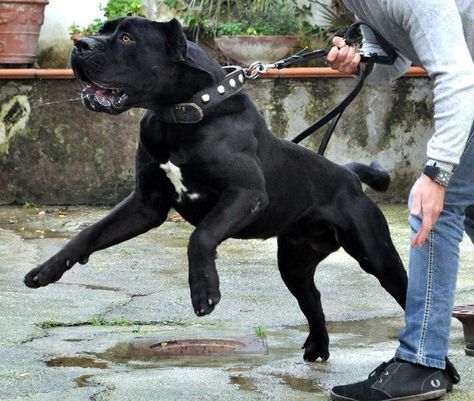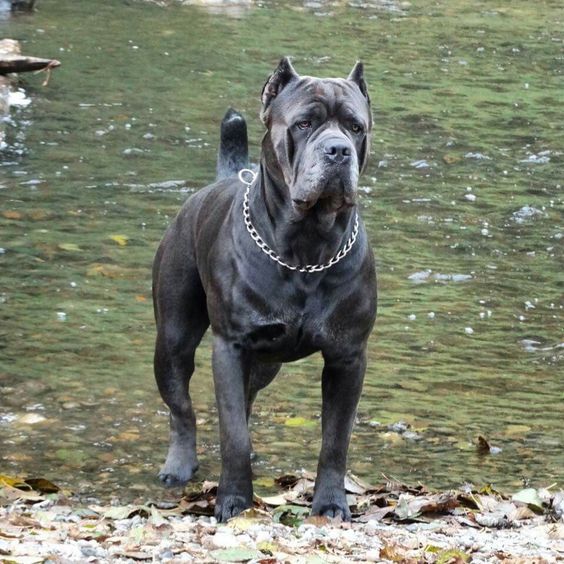
Cane Corsos are known for their impressive size, strength, and loyalty. As with any dog breed, barking is a natural form of communication. However, the extent to which Cane Corsos bark can vary based on different factors. In this article, we will explore the reasons behind Cane Corsos’ barking, how to manage excessive barking, their barking tendencies at night and during the daytime, and a comparison of their barking habits with Rottweilers.
Which Things Trigger Cane Corso Barking?
Cane Corsos, with their imposing presence and vigilant nature, have a distinct way of expressing themselves – barking. Understanding what prompts these vocal outbursts can provide valuable insights into their behavior. Here are some common triggers for Cane Corso barking:
Territorial Instincts
Cane Corsos are deeply protective of their domain. When they sense an intrusion or a perceived threat to their home and territory, they unleash a powerful bark as a warning signal. This territorial behavior is rooted in their ancestry as guard dogs and serves as a means to establish and defend their boundaries.
Stranger Anxiety
The arrival of unfamiliar people or animals can trigger a chorus of barks from a Cane Corso. Their cautious nature compels them to assess the intentions of newcomers. This behavior is an instinctual response designed to safeguard their family and surroundings, making them excellent watchdogs.
Alarm Calls
Cane Corsos have acute senses, allowing them to detect even the faintest of sounds. Doorbells ringing, sirens wailing, or any sudden noise can trigger their alarm system – barking. This instinctual response not only alerts their human companions but also showcases their vigilance in identifying potential threats.
Loneliness or Boredom
While Cane Corsos thrive on companionship, being left alone for extended periods can lead to feelings of loneliness and boredom. In an attempt to communicate their distress, they may resort to barking. This behavior highlights their need for mental and physical stimulation, emphasizing the importance of engaging activities and interactive toys.
How to Get Rid of Excessive Barking of a Cane Corso?
Dealing with excessive barking from your beloved Cane Corso can be both challenging and frustrating. Fortunately, there are effective strategies you can employ to manage and reduce their vocal tendencies. Here are some valuable approaches:
Proper Training
The foundation for addressing excessive barking lies in training. Enroll your Cane Corso in obedience training sessions that focus on teaching them essential commands, including “quiet” or “enough.” Positive reinforcement techniques can help your dog understand when to stop barking on command. Consistency is key in reinforcing this behavior and providing them with the necessary cues to control their vocalizations.
Socialization
Exposing your Cane Corso to a variety of experiences is crucial in minimizing anxiety-based barking triggered by unfamiliar situations or people. Socialization helps your dog become accustomed to different environments, people, and animals, reducing the likelihood of barking out of fear or uncertainty. Gradually introduce them to new stimuli and ensure positive interactions, promoting a confident and well-adjusted canine companion.
Mental and Physical Stimulation
An active mind and body can help channel your Cane Corso’s energy away from excessive barking. Regular exercise is essential for this breed, as it helps release pent-up energy and reduces restlessness that might lead to incessant barking. Interactive toys, puzzle games, and challenging tasks can engage their cognitive abilities, preventing boredom-related barking.
Do Cane Corsos Bark a Lot at Night or Daytime?
Understanding the barking patterns of your Cane Corso can shed light on their communication tendencies and help you manage their behavior effectively. While every dog has its individual quirks, Cane Corsos do exhibit some common patterns when it comes to barking during different times of the day.
Nocturnal Barking
It’s not uncommon for some Cane Corsos to become more vocal during the nighttime hours. This behavior can be attributed to their heightened senses in the dark. Their acute hearing and ability to perceive subtle movements make them more attuned to sounds that might go unnoticed during the day. Nocturnal barking could be triggered by various factors, such as distant noises, rustling leaves, or even the presence of nocturnal creatures. To address this, creating a comfortable sleeping environment and ensuring they get sufficient exercise during the day can help reduce nighttime barking.
Daytime Barking
Barking during the daytime is often a response to the stimuli and interactions that accompany daylight hours. Cane Corsos are watchful by nature, and any changes or activities in their environment can prompt them to voice their observations. This could include people passing by, delivery personnel, or other animals in the vicinity. Additionally, if your Cane Corso is left alone for extended periods during the day, they might exhibit boredom-induced barking as a way to seek attention or alleviate their restlessness. To address daytime barking, providing mental and physical stimulation, and minimizing isolation can help curb this behavior.
Do Cane Corsos Bark More Than Rottweilers?

The comparison between the barking tendencies of Cane Corsos and Rottweilers opens up an intriguing exploration into the unique vocal behaviors of these two formidable breeds. While it’s not a simple case of one being more vocal than the other, understanding the factors at play can offer insights into their communication styles.
Individual Variability
The barking propensity of any dog, regardless of breed, can be remarkably diverse. Just as people have distinct personalities, Cane Corsos and Rottweilers exhibit varying levels of vocalization. Some individuals within a breed may have a more vocal nature, while others may be quieter. Factors such as genetics, early experiences, and temperament contribute to this individual variability. Thus, comparing barking tendencies solely on a breed level may not capture the entire picture.
Breed Characteristics
Cane Corsos and Rottweilers possess different temperamental traits that influence their barking habits. Cane Corsos, originally bred as guard dogs, have a protective and vigilant nature. This can result in more pronounced barking when they perceive a threat. Rottweilers, also protective in their own right, are known for their loyalty and watchfulness. Their barking may manifest as a response to perceived danger or unfamiliar situations. Understanding these breed-specific characteristics helps decipher the motivations behind their vocalizations.
Training and Socialization
Proper training and socialization play pivotal roles in managing barking behaviors in both Cane Corsos and Rottweilers. Early exposure to various environments, people, and animals can help mitigate anxiety-induced barking. Training sessions that focus on teaching commands like “quiet” or “enough” can provide effective tools to control excessive barking. The establishment of a strong bond through positive reinforcement and consistent training can yield impressive results in curbing unwanted barking tendencies.
FAQs
1. Do Cane Corsos make good guard dogs?
Yes, Cane Corsos are excellent guard dogs due to their protective nature and territorial instincts.
2. Are Cane Corsos prone to excessive barking?
Cane Corsos can be prone to excessive barking if not properly trained and socialized.
3. Can I train my Cane Corso to bark less?
Yes, with consistent training and positive reinforcement, you can reduce your Cane Corso’s excessive barking.
4. Do Cane Corsos get along with other pets?
Cane Corsos can get along with other pets if introduced and socialized correctly from a young age.
5. Are Cane Corsos suitable for apartment living?
Cane Corsos are better suited for homes with a yard where they can exercise and monitor their territory.
6. How do I address nighttime barking?
Address nighttime barking by ensuring your Cane Corso has sufficient exercise during the day and creating a comfortable sleep environment.
7. Are Rottweilers quieter than Cane Corsos?
Rottweilers and Cane Corsos have different barking tendencies, but individual variations exist.
8. What age should I start training my Cane Corso?
Start training your Cane Corso as a puppy to establish good behavior patterns early.
9. Do Cane Corsos require a lot of mental stimulation?
Yes, Cane Corsos are intelligent dogs that benefit from mental stimulation through training and interactive toys.
10. Can I use anti-bark collars to control barking?
While anti-bark collars might help control barking, they should be used with caution and under professional guidance.
Conclusion
In conclusion, understanding the intricacies of Cane Corsos’ barking behaviors goes beyond simple generalizations and necessitates a deeper exploration of their individuality, breed characteristics, and the impact of training and socialization. These majestic and loyal dogs communicate through barking, a natural form of expression rooted in their roles as guard dogs and protectors. By delving into the various triggers that prompt their vocalizations, such as territorial instincts, stranger anxiety, alarm calls, and boredom, we gain insights into the world of a Cane Corso’s perceptions and responses.
With over 4 years of devoted companionship with my beloved Labrador Retriever, Robin, I have cultivated a deep understanding and expertise in all things canine. From training and behavior to health and well-being.



